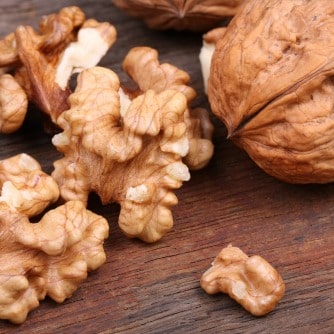Previous studies have shown that walnuts may slow cancer and improve memory, concentration, and information processing speed, as well as lowering diabetes risk and boosting male fertility. Now, more recently, initial findings from the Walnuts and Healthy Aging (WAHA) study presented at Experimental Biology 2016 (EB), are showing that daily walnut consumption positively impacts blood cholesterol levels, without adverse effects on body weight among older adults. The WAHA study is a dual site 2-year clinical trial, conducted by researchers from the Hospital Clinic of Barcelona and Loma Linda University and is focused on determining the effect that walnuts have on health issues that are age-related.
The 707 older adults who participated in the study consumed either a daily dose of walnuts (compiling less than 15% of daily caloric intake), or a diet absent of all nuts. There was no guidance given, as to suggested total calorie and macronutrient intake, or food substitutions for walnuts. After one year, there was no evident effect on body weight, triglycerides, and HDL cholesterol, for either group. However, those whose diets consisted of the walnuts resulted in significant reductions in LDL cholesterol in comparison with the nut-free diet.
Additional new research abstracts presented at the EB meeting included information regarding walnuts and the following:
Gut health – A recent study conducted by researchers at the Agricultural Research Service, United States Department of Agriculture (USDA) found that eating 1.5 ounces of walnuts daily significantly affects the bacteria in the human gut, in a manner that is favorable to decreasing inflammation and cholesterol, which are two known indicators of heart health.
Hunger and Satiety – For the first time, it has been shown that the types of fat consumed on a daily basis can change long-term appetite responses, such as hunger and satiety. Researchers from the University of Georgia found that eating a diet high in polyunsaturated fat, after meals rich in saturated fat, favorably alters hunger and satiety markers. At 13 grams per ounce, walnuts are a great choice for getting more polyunsaturated fat.
Metabolic Health – A recent study conducted at Oregon State University found that a diet consisting of walnuts supplemented with polyphenol-rich foods such as raspberries, cherries or green tea may help reduce inflammation. This study was conducted on mice who were given walnuts on their own or along with polyphenol-rich foods, however, as it was performed on animals, the results can not yet be considered applicable to humans.
Definitive scientific conclusions cannot yet be drawn from the abstracts presented at EB 2016, however these findings help advance the knowledge of possible benefits of consuming walnuts as part of a healthy diet.




